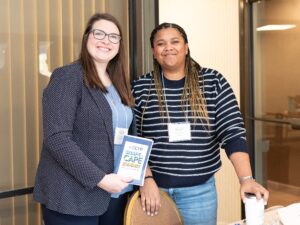HYANNIS — Over 300 young people, many in their 20s and 30s, gathered on April 9 in Hyannis to discuss the future of the economy on Cape Cod — and their possible roles in creating it.

Between sessions at the Cape Cod Young Professionals annual Shape the Cape Summit that day, Emily Wagner, the nonprofit’s executive director, said that nationwide challenges have hit the Cape’s economy and working people hard.
“There’s a housing crisis, a child-care crisis, a mental health crisis,” said Wagner, who took over as executive director in 2024 after working for nearly three years as director of communications for the Virginia-based National Head Start Association.
Then Wagner named a different problem — and hinted at a possible solution. There is “a general crisis of social connectedness here on Cape Cod,” she said. “Especially in the changing political climate, local is all we have.”
Entrepreneurism is strong on the Cape. Sixty-four percent of the region’s businesses have fewer than five employees, according to a 2021 survey conducted by the Cape Cod Commission — about eight points higher than the state and national levels. But it’s rare for businesses here to be owned by young people: over 75 percent of business owners in the commission’s survey said they were 45 or older, and more than a quarter were 65-plus.
Wagner’s sense that there’s a social connection problem that’s most acute among young people seems to reflect basic demographics. According to data compiled by the Cape Cod Commission in 2024, the Cape’s population is significantly older than that of the rest of the state. While the state’s median age is 40, the median age here is between 57 and 63, depending on the town. One interpretation: the Cape is losing participants in the year-round economy as younger people find life unaffordable here and move away, Wagner said.
Topics at the summit ranged from negotiating a salary to getting enough sleep. One was on commuting: “Wait… You Cross the Bridge EVERY Day?”

But there were hopeful stories, too. Provincetown musician and playwright Jon Richardson said that staying in town was part of what helped him “make it” as an artist. “Staying here full-time has helped me create more of a name for myself,” he said.
Both visitors and locals become fans that way, he said. “People who come here want to see performers who are embedded in the community,” he said. And “in the off season, people are so excited for content that they’ll come out and see you.”
He said he’d joined a conference panel to answer questions and offer pointers but also “to show people that, yes, these things are possible.”
The biggest hurdle for artists, he said, is housing. “If you can find it,” he said, “you can have a really amazing career.”
One packed session advertised a simple but provocative topic: “Should I Start a Business?”
“Big corporations jump on Cape Cod’s local industries like sharks,” warned Talita de Rocha of Vacation Cape Cod, one of three panelists on the subject. What Cape-based entrepreneurs have is local knowledge, though. To succeed, “you have to understand the market,” she said.
Corey Hendricks, a member of the Mashpee Wampanoag tribe, spoke on a panel about the so-called blue economy, where ocean resources are linked to livelihoods. Hendricks said environmental protection along the coast needs to be tended. He said the construction of large vacation homes can make already scarce aquaculture space even rarer. “We really don’t have a working coastline anymore,” he said. “If no one’s out there caring, big money will just push the blue economy out.”
The seasonal economy works pretty well for Dylan Cannon, owner of Drifters in South Chatham. “In terms of business strategy, the things that aren’t broken don’t need to be fixed,” he said. Yet he noted it can be especially difficult for restaurant owners to get through the steep decline of the off-season. “It’s not easy,” he said. But making connections with other restaurant owners was what helped him through his first winter: “You go to other restaurants, ask them if they’re doing OK. They say no. You say, same.”
Wagner hopes the Shape the Cape Summit is helpful in a place where young people are nearly all “facing the same isolation, and they don’t have a way to network.”
A total of 353 people attended the summit, Wagner said, working in 46 different kinds of businesses. The nonprofit sector had the highest representation with 62 participants. The for-profit sector included 36 who worked in banking, 21 in online media, 20 in human services, and 19 in construction, Wagner said.
Although CCYP was founded in 2005 with the goal of facilitating connections among “young professionals” on Cape Cod, Wagner says the group isn’t picky about who joins.
“We’re focused on career experience in the industry that you’re in,” she says. “Let’s say you were a musician for 20 years, then you switched to real estate. You could be 70 and just starting out in your new career — so you’d count as a member of CCYP.”



